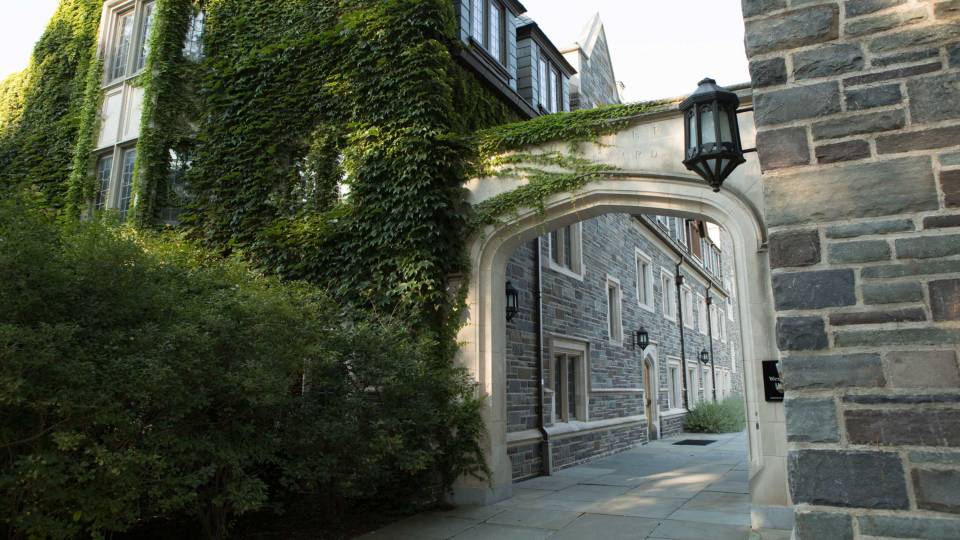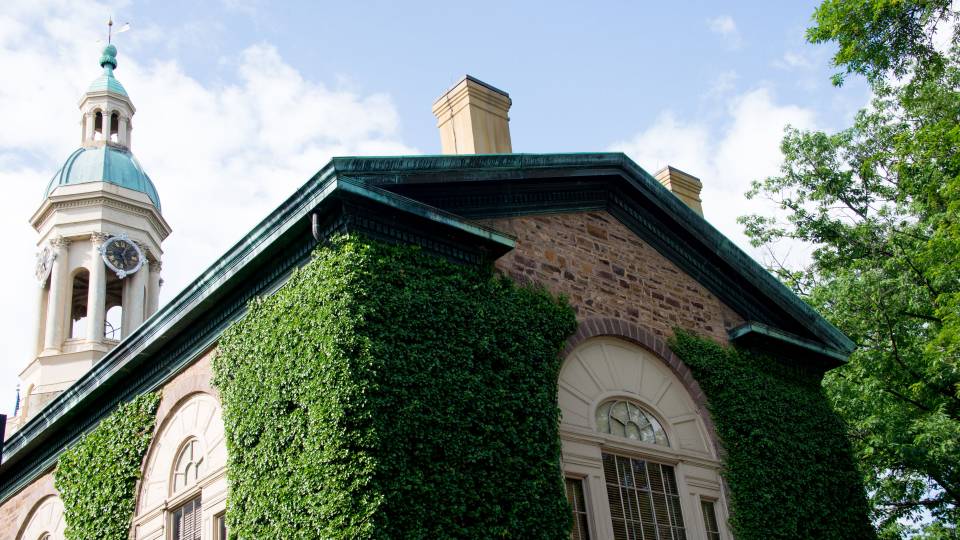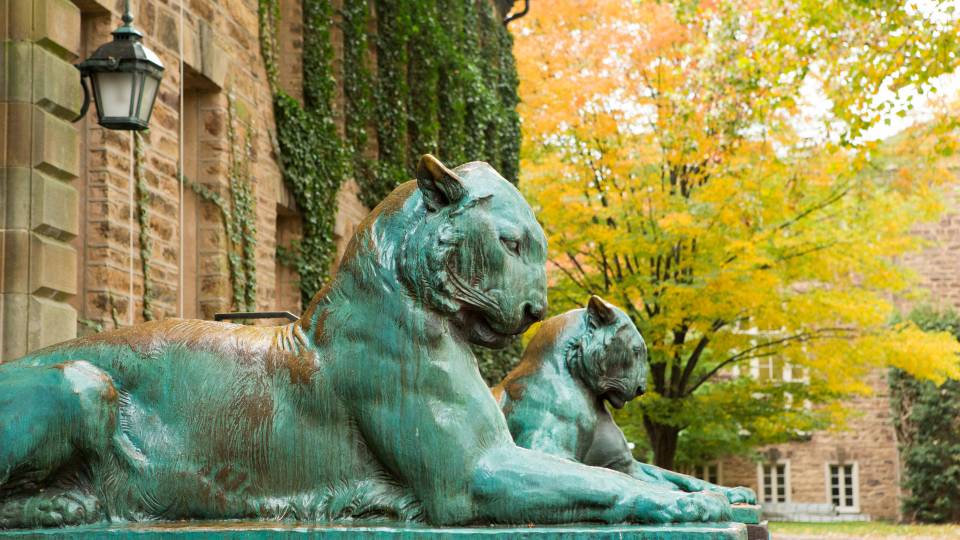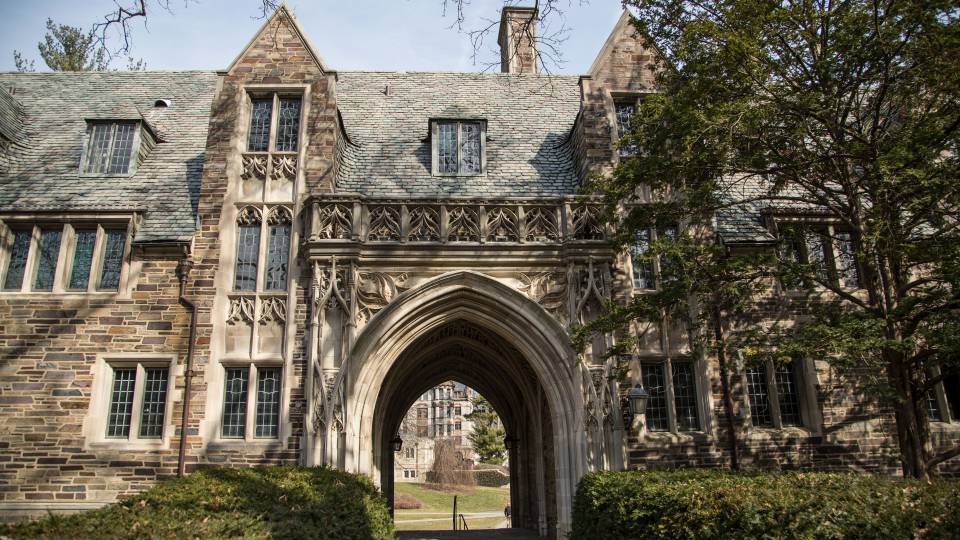Sixteen Princeton University faculty members were transferred to emeritus status in recent action by the Board of Trustees. Transfers are effective July 1, 2015, except where noted.
They are:
- Steven Bernasek, professor of chemistry;
- David Botstein, the Anthony B. Evnin '62 Professor of Genomics and professor of molecular biology and the Lewis-Sigler Institute for Integrative Genomics, effective Feb. 1, 2015;
- Erhan Çinlar, the Norman John Sollenberger Professor in Engineering and professor of operations research and financial engineering;
- Caryl Emerson, the A. Watson Armour III University Professor of Slavic Languages and Literatures and a professor of Slavic languages and literatures and comparative literature;
- Christodoulos Floudas, the Stephen C. Macaleer '63 Professor in Engineering and Applied Science and professor of chemical and biological engineering, effective Feb. 1, 2015;
- James Gould, professor of ecology and evolutionary biology;
- Edward Groth, professor of physics;
- Philip Holmes, the Eugene Higgins Professor of Mechanical and Aerospace Engineering;
- Paul Krugman, professor of economics and international affairs in the Woodrow Wilson School of Public and International Affairs;
- Bede Liu, professor of electrical engineering;
- Alan Mann, professor of anthropology;
- Joyce Carol Oates, the Roger S. Berlind '52 Professor of the Humanities and professor of creative writing in the Lewis Center for the Arts;
- Clarence Schutt, professor of chemistry;
- Lee Silver, professor of molecular biology and public affairs;
- James Trussell, the Charles and Marie Robertson Professor of Public and International Affairs and professor of economics and public affairs, effective March 1, 2015; and
- Sigurd Wagner, professor of electrical engineering, effective Sept. 1, 2015.
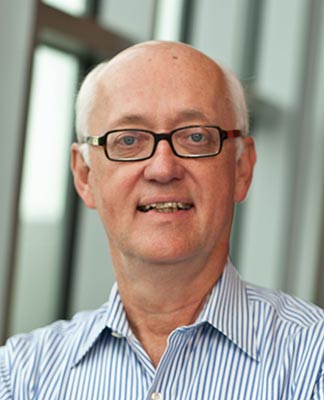
Steven Bernasek(Photo by Denise Applewhite, Office of Communications)
Steven Bernasek studies the fundamental dynamics of chemical reactions that occur at solid surfaces and interfaces. He has made significant contributions in topics such as the surface chemistry of transition metal oxides and the functionalization and modification of the surfaces of electronic device materials.
Bernasek has held a number of administrative roles in the chemistry department and also has provided extensive service to the National Science Foundation. Bernasek's honors include the American Chemical Society's ExxonMobil Award in Solid State Chemistry and Arthur W. Adamson Award for Distinguished Service in the Advancement of Surface Chemistry. He is a fellow of the American Association for the Advancement of Science and the American Vacuum Society.
Bernasek earned his B.S. in chemistry at Kansas State University and received his Ph.D. in physical chemistry from the University of California-Berkeley. He worked as a postdoctoral researcher at the Lawrence Berkeley National Laboratory before coming to Princeton in 1975. Upon his retirement from Princeton, Bernasek will become the director of the science division of Yale-NUS College in Singapore.
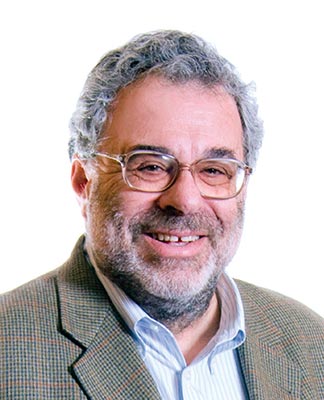
David Botstein(Photo by Renee Fitts)
David Botstein is a pioneer in the field of genetics. He and three colleagues proposed a method for mapping genes that laid the groundwork for the Human Genome Project, and he was a leading scientist in sequencing the genome of the yeast Saccaromyces cerevisiae, the first eukaryotic genome to be sequenced. Botstein also has studied the use of genetic methods to understand biological functions.
He came to Princeton in 2003 to lead the Lewis-Sigler Institute for Integrative Genomics, where he helped establish the interdisciplinary Integrated Science Curriculum for undergraduates, the Program in Quantitative and Computational Biology for graduate students, and the Lewis-Sigler Fellows program for early-career scientists. His honors include election to the U.S. National Academy of Sciences, the Genetics Society of America Medal, and the Breakthrough Prize in Life Sciences.
Botstein earned his A.B. at Harvard University and his Ph.D. at the University of Michigan. He taught at the Massachusetts Institute of Technology and Stanford University's School of Medicine and worked at Genentech Inc. before coming to Princeton. He is now the chief scientific officer of Calico, a research and development company studying anti-aging and increased lifespan.
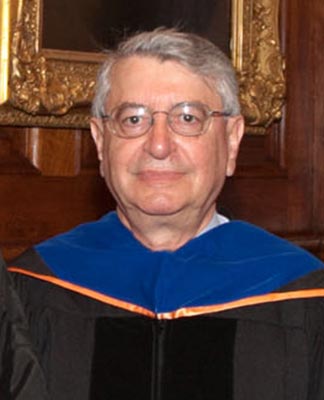
Erhan Çinlar(Photo by Denise Applewhite, Office of Communications)
Erhan Çinlar is one of the pioneers in the field of stochastic processes, an area of mathematics dealing with probability and with applications in a number of fields including engineering. Çinlar's research interests include semi-Markov processes and renewal theory, as well as creating models for engineering challenges such as reliability of complex devices and fatigue crack growth.
In addition to his University roles as a popular teacher and capable administrator, he has been heavily involved in the international probability community. Çinlar has served on boards and councils of organizations in the field, edited peer-reviewed journals, authored textbooks, and organized an annual gathering of probabilists from around the world called the Seminar on Stochastic Processes.
Çinlar completed his undergraduate and graduate studies at the University of Michigan and taught at Northwestern University before coming to Princeton in 1985. He is a fellow of the Institute of Mathematical Statistics and the Institute for Operations Research and Management Sciences, and he received the Recognition for Eminent Research from the Bernoulli Society in 2012.
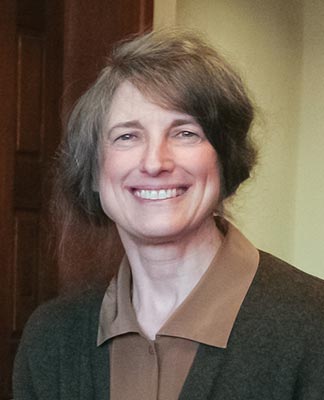
Caryl Emerson(Photo by Denise Applewhite, Office of Communications)
Caryl Emerson is a scholar of 19th-century Russian literature and an expert on the work of 20th-century philosopher and literary scholar Mikhail Bakhtin. In addition to editing volumes of essays and writing more than 100 scholarly articles, she has authored a number of books, including "The First Hundred Years of Mikhail Bakhtin" (1997) and "All the Same the Words Don't Go Away: Essays on Authors, Heroes, Aesthetics and Stage Adaptations from the Russian Tradition" (2010).
Emerson has taught and advised thousands of students, twice served as chair of Slavic languages and literatures, and twice been involved with University-wide productions of plays by Russian author Alexander Pushkin. Her honors include a Guggenheim fellowship and lifetime awards from the American Association of Teachers of Slavic and East European Languages and the Association for Slavic, East European and Eurasian Studies.
Emerson earned her bachelor's degree in Russian literature from Cornell University, her master'’s degrees in Russian studies and Russian language teaching from Harvard, and her Ph.D. in comparative literature from the University of Texas-Austin. She taught at Cornell before coming to Princeton in 1988.
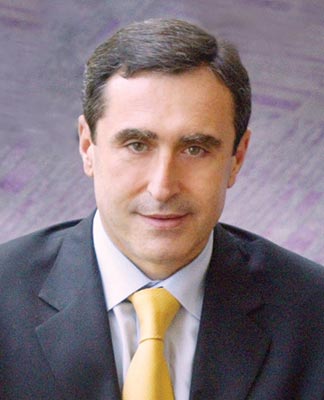
Christodoulos Floudas(Photo by Frank Wojciechowski)
Christodoulos Floudas, who joined the faculty in 1986, studies global optimization, deriving the best solution to a mathematical problem across a variety of contexts, from chemical plants to the folding of proteins. His scholarly output includes writing more than 300 peer-reviewed journal articles and two textbooks.
Floudas' honors include election to the U.S. National Academy of Engineering and Academy of Athens, the Computing in Chemical Engineering Award from the American Institute of Chemical Engineers, and the Gold Medal of the Hellenic Operations Research Society.
Floudas completed his undergraduate studies at the Aristotle University of Thessaloniki and his Ph.D. in chemical engineering at Carnegie Mellon University. He is now the director of the Energy Institute and the Erle Nye '59 Chair Professor for Engineering Excellence in the Artie McFerrin Department of Chemical Engineering at Texas A&M University.
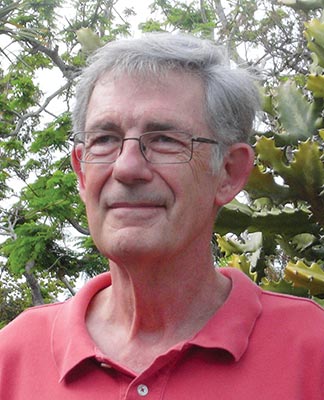
James Gould(Photo by Carol Grant Gould)
James Gould, who joined the Princeton faculty in 1975, studies animal behavior. For many years he studied navigation and communication in bees, then shifted to studying how female fish choose their mates. With his wife, Carol, he has written books about sexual selection and animal communication that appeal to both the general public and academic researchers.
Gould's honors include several teaching awards, including the Animal Behavior Society’s Distinguished Teacher of the Year Award. At Princeton, he has taught popular courses on animal behavior and introductory biology; initiated a summer program in marine biology at the Bermuda Institute of Ocean Science; and served as a departmental representative since 1993, shepherding thousands of students through the department.
Gould received his bachelor's degree in molecular biology from the California Institute of Technology and his Ph.D. from Rockefeller University.
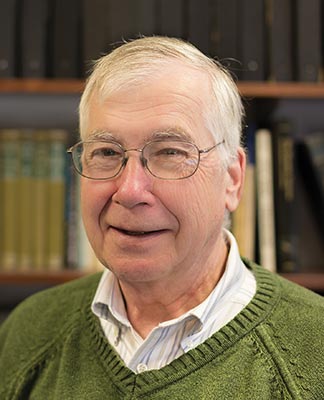
Edward Groth(Photo by Theodore Lewis III, Department of Physics)
Edward Groth, a member of the Princeton faculty since 1972, was a key figure in the Hubble Space Telescope project, serving as data and operations team leader before launch and as deputy principal investigator for the Wide Field and Planetary Camera after the 1990 launch.
He designed a survey of the sky now called the "Extended Groth Strip," in which 50,000 galaxies have been identified and are now being studied. Studying the Groth Strip with two colleagues, Groth made the first space-based detection of the distortion of images of distant galaxies because of the large concentrations of mass between us and the galaxies. He also has been at the vanguard of scientific computation, helping to start the digital archive for the Hubble Space Telescope and writing programs to adjust distorted telescope images, among other projects.
Groth earned his B.S. in physics from Caltech and received his Ph.D. from Princeton. He was an instructor at Princeton for a year before joining the faculty.
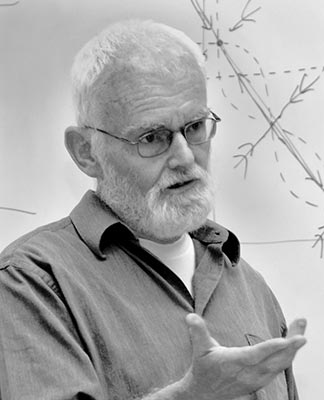
Philip Holmes(Photo by Denise Applewhite, Office of Communications)
Philip Holmes' research on dynamical systems and nonlinear mechanics is at the intersection of the fields of applied mathematics, mechanical engineering and neuroscience.
Holmes' early work included a focus on chaos theory, the foundation of dynamical systems. His publications include research papers important to understanding instabilities, turbulence and the buckling of beams. He now develops qualitative and analytical methods for studying mathematical models of cognitive processes and solid, fluid and biological systems, such as the neuromechanics of legged locomotion and swimming, which in turn have implications for the design of vehicles and robots.
Holmes is a fellow of the American Mathematical Society, the American Physical Society, and the Society for Industrial and Applied Mathematics. He is a member of the American Academy of Arts and Sciences. Holmes completed his B.A. in engineering science at the University of Oxford and earned his Ph.D. at the University of Southampton. He taught at Cornell before coming to Princeton in 1994.
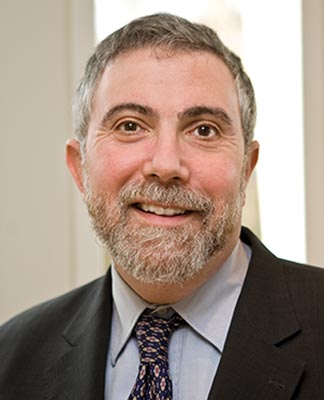
Paul Krugman(Photo by Brian Wilson, Office of Communications)
Paul Krugman was the recipient of the 2008 Nobel Memorial Prize in Economic Sciences for his revolutionary work in international trade theory and is a prominent columnist and commentator.
Krugman's best-known research provided new understanding and modeling of why similar countries trade similar goods and why firms and workers concentrate in a few large markets. His earlier work focused on topics in international macroeconomics such as overvalued fixed exchange rates and exchange rate target zones. Krugman has authored numerous influential papers and 22 books, and since 1996 he has been writing for the general public, first with a column for Slate and then for The New York Times. His honors include the John Bates Clark Medal for top American economists under 40 and the National Association of Business Economics'’ Adam Smith Award.
Krugman earned his bachelor's degree at Yale University and his Ph.D. from MIT. He taught at Yale, MIT and Stanford before coming to Princeton in 2000. Upon his transfer to emeritus status, he will join the City University of New York's Graduate Center and Luxembourg Income Study Center.
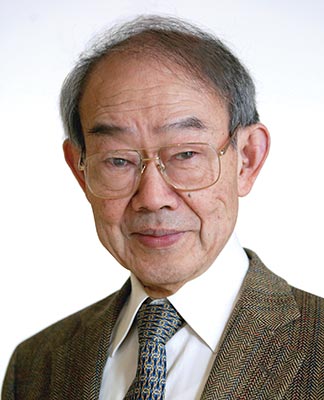
Bede Liu(Photo by Frank Wojciechowski)
Bede Liu, who joined the Princeton faculty in 1962, has conducted pioneering research in signal processing, video coding, digital watermarking and multimedia technology, with key contributions in both theory and applications.
Liu also helped build the electrical engineering department's information sciences and systems group, served as department chair for three years and advised more than 50 Ph.D. candidates. He also consulted with private sector companies and has been active in the Institute of Electrical and Electronics Engineers (IEEE), of which he is a fellow and recipient of highest awards in the Circuits and Systems Society and Signal Processing Society. Liu also is a member of the U.S. National Academy of Engineering, an academician of Academia Sinica, and a foreign member of the Chinese Academy of Sciences.
Liu earned a bachelor's degree at National Taiwan University and completed his graduate studies at the Polytechnic Institute of Brooklyn. He worked at Western Electric Co., DuMont Laboratories and Bell Laboratories before coming to Princeton.
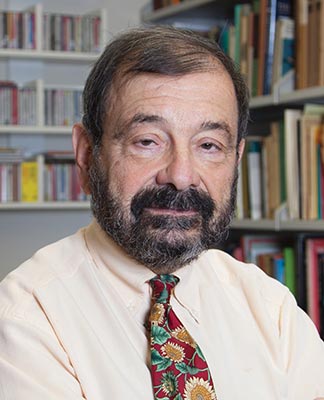
Alan Mann(Photo by Brian Wilson, Office of Communications)
Alan Mann is a bioanthropologist whose research has focused on paleoanthropology and human evolution, and his publications include three benchmark reference works in these fields.
Mann earned his B.A. at the University of Pittsburgh and his Ph.D. at the University of California-Berkeley. He taught at the University of Pennsylvania for 32 years, 13 of which he was also a visiting professor at Princeton, and he joined the Princeton faculty in 2001.
He has served as the curator of the physical anthropology section at Penn Museum, conducted field research in Africa and Europe and been a popular teacher at Princeton. For years, he taught a summer field course on modern human origins in the Bordeaux region of France; the course included excavations at a Neandertal site. His honors include being awarded the Chevalier dans l'Ordre des Palmes Academiques by the National Education Ministry of France for his anthropological research and mentoring of French students.
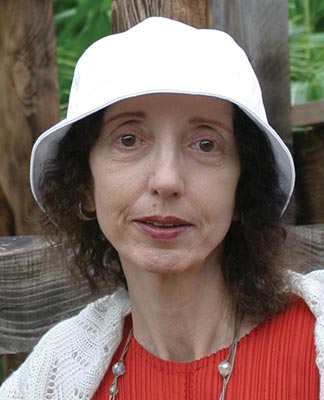
Joyce Carol Oates(Photo by John Jameson, Office of Communications)
Joyce Carol Oates is a beloved, prolific and acclaimed American author whose work spans many genres including novel, short story, memoir, detective fiction, drama, poetry and literary criticism. She joined the Princeton faculty in 1978.
Her awards include the 1970 National Book Award for her novel "them," the PEN/Malamud Award for Excellence in the Art of the Short Story, the Carl Sandburg Award for Lifetime Achievement, the American Humanist Association's Humanist of the Year Award, the National Book Critics Circle's Ivan Sandrof Lifetime Achievement Award, and the 2011 National Humanities Medal.
Oates received her bachelor's degree at Syracuse University and her M.A. in English at the University of Wisconsin-Madison. She taught at the University of Detroit and University of Windsor before coming to Princeton.
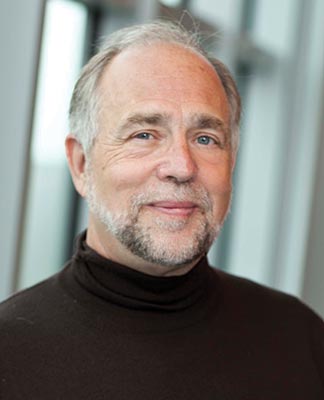
Clarence Schutt(Photo by Denise Applewhite, Office of Communications)
Clarence Schutt's major research focus has been investigating how nature converts chemical energy into movement, with a focus on the structure and dynamics of crystalline profilin-beta-actin and the family of actin-binding proteins.
Early in his career, Schutt published a landmark study on methods for revealing the structure of an intact virus using X-ray crystallography that formed the core of modern crystallographic data collection programs for large biological structures. After his son was diagnosed with autism, Schutt developed an interest in autism research and taught courses on the structural biology of neurodevelopmental disorders.
Schutt received his B.S. in physics at the University of Michigan, his M.S. in physics at Michigan State University and his Ph.D. in biochemistry and molecular biology at Harvard. Before coming to Princeton in 1985, he worked as a researcher at the Medical Research Council Laboratory of Molecular Biology. After retiring, Schutt will continue as the director and chief scientific officer of the Nancy Lurie Marks Family Foundation, which is committed to helping autistic people lead rewarding lives.
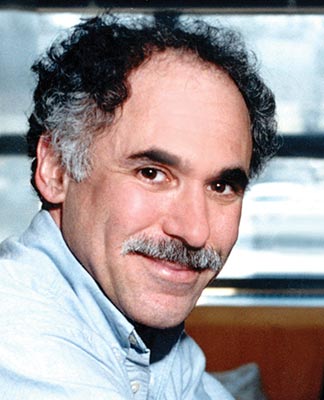
Lee Silver(Photo by Denise Applewhite, Office of Communications)
Lee Silver is an expert on the social and ethical implications of advances in reproductive technology and genetics, including human stem cell research, cloning, genetic testing, genetic selection and genetic engineering. His 1997 book "Remaking Eden: Cloning and Beyond in a Brave New World" has been published in over a dozen languages. Silver's early research interests were on mouse genetics, including proteins that seemed to play a role in regulating gene activity in mice and the T gene product's role in development.
Silver is a fellow of the American Association for the Advancement of Science and was a member of the New Jersey Bioethics Commission Task Force. He has testified on reproductive and genetic technologies before committees of the U.S. Congress and New York State Senate.
Silver earned bachelor's and master's degrees at Penn and his Ph.D. at Harvard. He worked at Sloan-Kettering Cancer Center and Cold Spring Harbor Laboratory before coming to Princeton in 1984.
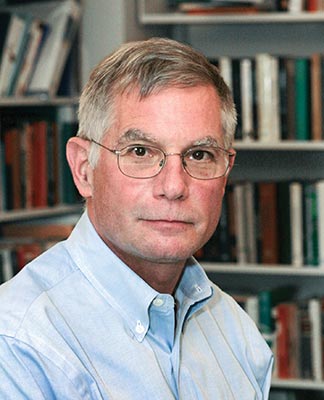
James Trussell(Photo by Brian Wilson, Office of Communications)
James Trussell, whose research contributions have focused on birth control, demographic methods and mathematical models of population, came to Princeton as a doctoral student in 1973 and joined the faculty in 1975. He earned his B.A. in mathematics at Davidson College and earned a B.Phil. in economics at Nuffield College, University of Oxford.
Trussell's scholarly work includes several books and more than 350 scientific publications, including widely cited papers on methods for estimating mortality, age at first marriage, the economic consequences of teenage childbearing, spline interpolation of demographic data, natural fertility, and contraceptive failure.
Trussell has been closely connected with Princeton's economics department, Wilson School and Office of Population Research (OPR) during his four decades on campus, holding a number of administrative positions including associate dean of the Wilson School and director of OPR. He has also served on a number of committees through the National Academy of Science, and he is a fellow of the Population Council, the Guttmacher Institute, and the Royal College of Obstetricians and Gynaecologists.
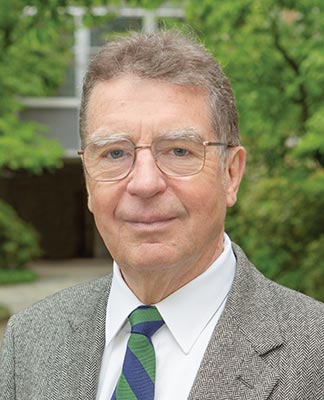
Sigurd Wagner(Photo by Denise Applewhite, Office of Communications)
Sigurd Wagner is a pioneer in photovoltaics and flexible and stretchable electronics. His research interests also have included semiconductors and solar cells.
In the 1970s, Wagner helped establish the National Renewable Energy Laboratory in Colorado. After coming to Princeton in 1980, his research laid the foundations of flexible electronics, creating objects that were forerunners of modern curved display screens and discovering elastically stretchable electrical conductors that are now being incorporated into neuroscience research. His recent work with colleagues James Sturm and Naveen Verma is at the forefront of advanced high-performance electronic surfaces. Wagner is a fellow of the American Physical Society, a fellow of the Institute of Electrical and Electronics Engineers, a corresponding member of the Austrian Academy of Sciences, and an Alexander von Humboldt Foundation Senior Fellow.
Wagner completed his Ph.D. in physical chemistry at the University of Vienna. Prior to Princeton, he held positions at Ohio State University, Device Process Laboratory, Materials Research Laboratory, Bell Telephone Laboratories and the Solar Energy Research Institute (now the NREL).
